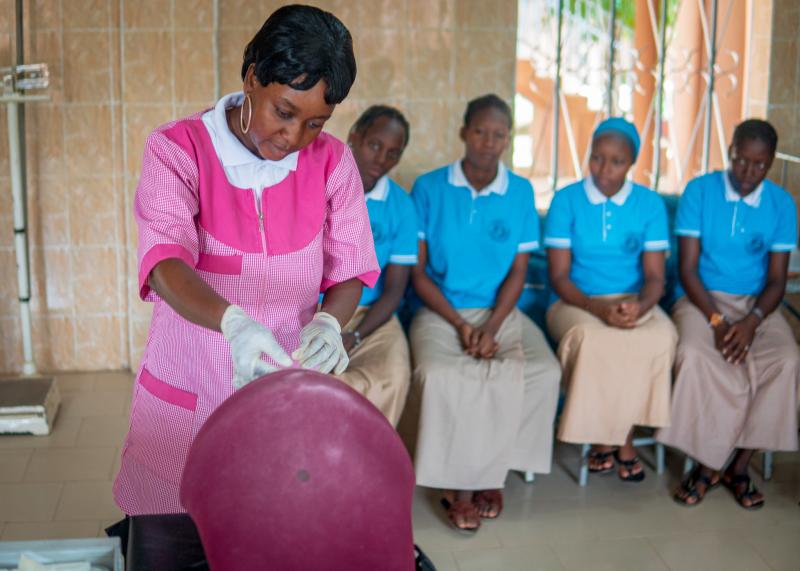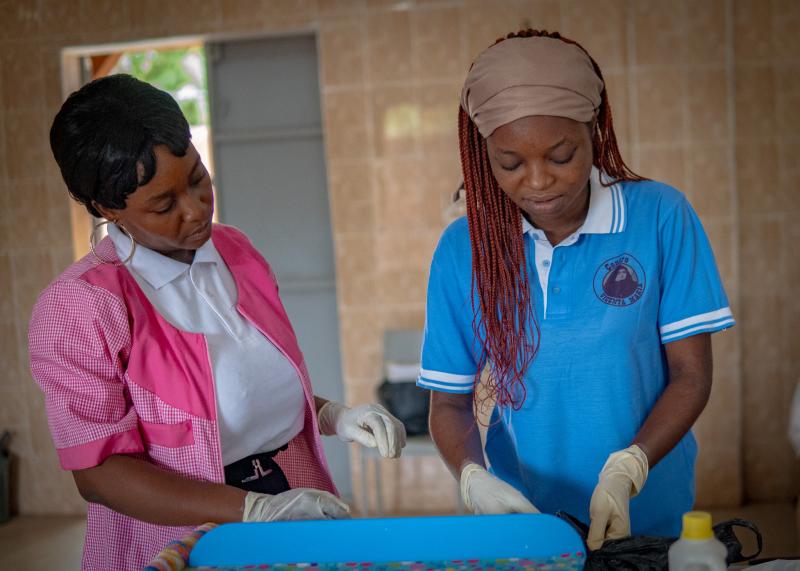Where We Work
See our interactive map


Photo by Amadou Iam Diallo for IntraHealth International.
For International Women’s Day, we’re celebrating women like Marguerite who inspire us, and donors, to #InvestInWomen.
On a sunny morning at the Vicenta Maria School of Ségou in Mali, Marguerite Diarra demonstrates active management of the third stage of labor using a Mama-U, a training model representing a woman’s uterus after childbirth.
Marguerite is on a mission to produce more skilled midwives who are ready to care for women in Mali, particularly in rural communities. She grew up in Beleko, in the region of Dioila, and became a midwife in 2016. Now she’s a permanent teacher at the school, specializing in obstetrical care.
Mali doesn’t have nearly enough midwives.
Mali, like other countries in Francophone West Africa, doesn’t have nearly enough skilled midwives or other health workers. There are just 6.1 midwives, nurses, and doctors to serve 10,000 people, far below the recommended amount, and the shortage is even worse in rural areas. This hinders women’s equitable access to health services, including for maternal care and family planning, and contributes to high rates of maternal mortality.
More than 500 women die for every 100,000 live births in Mali. And, traditional preservice education has not prepared health workers for real-life work conditions.
IntraHealth’s Classroom to Care (C2C) project, funded by Takeda Pharmaceutical Company Limited, aids 12 private health schools like Vicenta Maria in adopting a Competency-Based Approach (CBA) to education.
The Competency-Based Approach to education is based on population needs.
Whereas classic preservice training involves developing programs by subject or objective, CBA programs are developed based on population needs and the needed competencies for job requirements. In classic training the teacher provides the knowledge, while CBA teaching is based on facilitating student learning.
C2C has trained 250 teachers like Marguerite across Mali, Niger, and Senegal on the CBA approach.

Photo by Amadou Iam Diallo for IntraHealth International.
“These trainings really helped me understand my role as a teacher, become aware of my shortcomings, and apply new skills,” she says. "Previously, teachers did everything, but with CBA, we learned to put the student at the forefront of their own education. It's up to students to take the lead, and the teacher to guide and direct them. This has changed our way of preparing and delivering lessons," Marguerite says. This new approach has made classes more interactive and beneficial for students.
"We emphasize practice, which is very important in their learning to become competent health workers."
Marguerite also supervises students in community health centers, reference health centers in each district, and Nianankoro Fomba Hospital. "I am responsible for positioning students and tracking their skills development. Occasionally we go on field visits, because we emphasize practice, which is very important in their learning to become competent health workers.”
The project found that many health schools were lacking the equipment they needed for students to practice and has already provided anatomical models and other teaching equipment for establishing skills labs at the schools.
“The skills lab will help us a lot,” says Marguerite. “We already have a lot of equipment compared to other schools, but there are still gaps. For example, we don’t have the equipment required to insert or remove an IUD, or for demonstrating to women how to conduct breast self-examinations. There are also mannequins that we don’t have, and we need them to prepare students for their field placement, so when they are providing direct care to patients, they know what to do.”
By the end of the five-year project, C2C aims to have 580 teachers across Mali, Niger, and Senegal trained on the CBA, 9,720 students benefiting from quality training, and a skills lab at each school.
Meanwhile the C2C is also focusing on promoting diversity, equity, and inclusion (DEI) to increase the number of nursing and midwifery graduates, particularly women from marginalized communities. C2C conducted DEI situational analyses, and is using the results to develop school-specific plans that apply DEI best practices. to make all 12 partner schools more inclusive for women students and boost well-being and academic performance.
Get the latest updates from the blog and eNews




